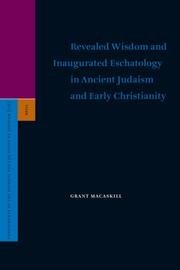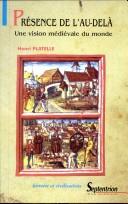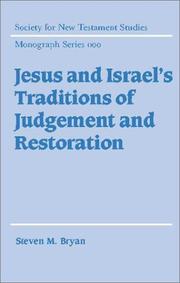| Listing 11 - 13 of 13 | << page >> |
Sort by
|

ISBN: 9789004155824 9004155821 9786611917197 1281917192 9047419243 9789047419242 9781281917195 6611917195 Year: 2007 Volume: 115 Publisher: Leiden : ; Boston : Brill,
Abstract | Keywords | Export | Availability | Bookmark
 Loading...
Loading...Choose an application
- Reference Manager
- EndNote
- RefWorks (Direct export to RefWorks)
This book examines four texts: 1 Enoch, 4QInstruction, Matthew and 2 Enoch. A common idea in these texts, which blend sapiential and apocalyptic elements, is that the revealing of wisdom to an elect group inaugurates the eschatological period. The emphasis on “revealed wisdom” is essentially apocalyptic, but facilitates the uptake of motifs, forms and language from the sapiential tradition and is important in explaining the fusion of the two traditions. In addition, revealed wisdom often has creational associations and this has significance for the notion of ethics in these texts. The book will interest anyone concerned with the development of Jewish and Christian eschatology and ethics. It also challenges the simplistic redactional assumptions of certain New Testament scholars.
Wisdom --- Eschatology. --- 236 --- Last things (Theology) --- Religious thought --- Theology, Doctrinal --- Religious aspects. --- Eschatologie. De novissimis --- Ethiopic book of Enoch --- 4QInstruction. --- Bible. --- Evangelie volgens Matteus --- Evangelie volgens Matthéüs --- Matʻae pogŭm --- Matai den --- Matai ni yoru fukuinsho --- Matius (Book of the New Testament) --- Mattá --- Matteo (Book of the New Testament) --- Matteus --- Matthäusevangelium --- Matthéüs --- Matthew (Book of the New Testament) --- Matthieu (Book of the New Testament) --- Sapiential work A --- Musar le-mevin --- Instruction (Dead Sea scroll) --- Mûsār le̳Mēvîn --- Dead Sea scrolls. --- 1Q/4QInstruction --- Book of Enoch, Ethiopic --- Enoch, Ethiopic Book of --- Book of the Ethiopic Enoch --- Äthiopischer Henoch --- Buch Henoch --- 1 Enoch (Apocryphal book) --- First Enoch (Apocryphal book) --- 1st Enoch (Apocryphal book) --- Criticism, interpretation, etc. --- Eschatology --- Eschatology, Jewish. --- Judaism --- Dogma. --- Eschatologie --- Eschatologie juive --- Judaïsme --- Dogme --- Doctrines. --- Doctrines --- Slavonic book of Enoch --- 4QInstruction --- Religious aspects

ISBN: 285939852X 9782859398521 2757422480 Year: 2004 Volume: 898 Publisher: Villeneuve d'Ascq: Presses universitaires du Septentrion,
Abstract | Keywords | Export | Availability | Bookmark
 Loading...
Loading...Choose an application
- Reference Manager
- EndNote
- RefWorks (Direct export to RefWorks)
Bien souvent dans la vision médiévale le monde des morts mérite à peine le nom d'Au-delà que nous lui donnons habituellement, tant sont perméables les frontières qui le séparent des vivants. C'est autour de cette évidence que sont ici rassemblées dix-huit articles qui nous offrent chacun à sa manière une transfiguration du temps, dans tous les sens de cette expression. En voici quelques exemples : le cadavre qui saigne en présence de son meurtrier fait entendre la Voix du sang ; sur le châtiment des parricides condamnés à l'errance perpétuelle flotte le syndrome de Caïn ; au fond des historiettes de Thomas de Cantimpré gît ce grand secret que tout a un sens, mais combien cette lumière est équivoque ! Dans les Regrets de la comtesse d'Alençon (+ 1292) la mourante triomphe de l'angoisse en lançant son cri : " Avec vous, Sire, droit comme ligne ! " Etc., etc. Et l'on aboutit ainsi à la conclusion d'Aaron J. Gourevich dans son livre L'image du monde chez l'homme médiéval (1980) (De cette manière) " la vie perd son caractère hasardeux et passager. Elle est insérée dans l'éternité et obtient par là un sens plus élevé... Le passé et l'avenir ont une valeur plus grande que le présent, ce temps éphémère ! "
Christian church history --- Christian dogmatics --- anno 500-1499 --- Death --- Eschatology --- Civilization, Medieval --- Church history --- Mort --- Eschatologie --- Civilisation médiévale --- Eglise --- Religious aspects --- Christianity --- History of doctrines --- Aspect religieux --- Christianisme --- Histoire des doctrines --- Histoire --- Christian literature, French --- Église catholique --- --Coutume --- --Pratique religieuse --- --Littérature chrétienne --- --Histoire et critique --- --Histoire des mentalités --- --Mort --- --Europe occidentale --- --History and criticism --- Catholic Church --- Customs and practice --- History --- Mediaeval history --- Religious mentalities --- #GGSB: Geschiedenis (Middeleeuwen) --- 236 --- 27 "04/14" --- Eschatologie. De novissimis --- Histoire de l'Eglise--Middeleeuwen --- History and criticism. --- Civilisation médiévale --- History and criticism --- Literature [Medieval ] --- Christian authors --- Europe [Western ] --- Customs and practices --- --Europe de l'Ouest --- Geschiedenis (Middeleeuwen) --- Church of Rome --- Roman Catholic Church --- Katholische Kirche --- Katolyt︠s︡ʹka t︠s︡erkva --- Römisch-Katholische Kirche --- Römische Kirche --- Ecclesia Catholica --- Eglise catholique --- Eglise catholique-romaine --- Katolicheskai︠a︡ t︠s︡erkovʹ --- Chiesa cattolica --- Iglesia Católica --- Kościół Katolicki --- Katolicki Kościół --- Kościół Rzymskokatolicki --- Nihon Katorikku Kyōkai --- Katholikē Ekklēsia --- Gereja Katolik --- Kenesiyah ha-Ḳatolit --- Kanisa Katoliki --- כנסיה הקתולית --- כנסייה הקתולית --- 가톨릭교 --- 천주교 --- Christian literature, French - History and criticism --- Coutume --- Pratique religieuse --- Littérature chrétienne --- Histoire et critique --- Histoire des mentalités --- Europe de l'Ouest --- CIVILISATION MEDIEVALE --- LITTERATURE CHRETIENNE MEDIEVALE --- MORT --- SPIRITUALITE --- HISTOIRE ET CRITIQUE --- ASPECT SOCIAL --- MOYEN AGE --- HISTOIRE

ISBN: 052181183X 0511329628 051148786X 0511176481 1280433930 0511045220 0511157355 1107125383 0511020058 9780511020056 9780511487866 9780511045226 9780511157356 9780521811835 0521010624 Year: 2002 Volume: 117 Publisher: Cambridge : Cambridge University Press,
Abstract | Keywords | Export | Availability | Bookmark
 Loading...
Loading...Choose an application
- Reference Manager
- EndNote
- RefWorks (Direct export to RefWorks)
Jesus and Israel's Traditions of Judgement and Restoration examines the eschatology of Jesus by evaluating his appropriation of sacred traditions related to Israel's restoration. It addresses the way in which Jesus' future expectations impinged upon his understanding of key features of Jewish society. Scholars have long debated the degree to which Jesus' eschatology can be said to have been realized. This 2002 book considers Jesus' expectations regarding key constitutional features of the eschaton: the shape of the people of God, purity, Land and Temple. Bryan shows that Jesus' anticipation of coming national judgement led him to use Israel's sacred traditions in ways that differed significantly from their use by his contemporaries. This did not lead Jesus to the conviction that Israel's restoration had been delayed. Instead he employed Israel's traditions to support a different understanding of restoration and a belief that the time of restoration had arrived.
Jews --- Messianic era (Judaism) --- Eschatology, Jewish. --- Restoration. --- 225.08*7 --- Eschatology, Jewish --- -Messianic era (Judaism) --- 236 --- Messiah --- Hebrews --- Israelites --- Jewish people --- Jewry --- Judaic people --- Judaists --- Ethnology --- Religious adherents --- Semites --- Judaism --- Theologie van het Nieuwe Testament: relatie met het jodendom --- Restoration --- Eschatologie. De novissimis --- Jesus Christ --- -Christ --- Cristo --- Jezus Chrystus --- Jesus Cristo --- Jesus, --- Jezus --- Christ, Jesus --- Yeh-su --- Masīḥ --- Khristos --- Gesù --- Christo --- Yeshua --- Chrystus --- Gesú Cristo --- Ježíš --- Isa, --- Nabi Isa --- Isa Al-Masih --- Al-Masih, Isa --- Masih, Isa Al --- -Jesus, --- Jesucristo --- Yesu --- Yeh-su Chi-tu --- Iēsous --- Iēsous Christos --- Iēsous, --- Kʻristos --- Hisus Kʻristos --- Christos --- Jesuo --- Yeshuʻa ben Yosef --- Yeshua ben Yoseph --- Iisus --- Iisus Khristos --- Jeschua ben Joseph --- Ieso Kriʻste --- Yesus --- Kristus --- ישו --- ישו הנוצרי --- ישו הנצרי --- ישוע --- ישוע בן יוסף --- المسيح --- مسيح --- يسوع المسيح --- 耶稣 --- 耶稣基督 --- 예수그리스도 --- Jíizis --- Yéshoua --- Iėsu̇s --- Khrist Iėsu̇s --- عيسىٰ --- Views on Judaism --- -Views on Judaism --- 225.08*7 Theologie van het Nieuwe Testament: relatie met het jodendom --- Jesus Christ. --- Jews. --- Messianic era (Judaism). --- Christianity --- Religion --- Philosophy & Religion --- Views on Judaism. --- Bible --- Prophecies --- Christ --- Restoration of the Jews in rabbinical literature --- Zionism --- Biblia --- عيسىٰ --- Arts and Humanities --- Jews - Restoration.
| Listing 11 - 13 of 13 | << page >> |
Sort by
|

 Search
Search Feedback
Feedback About
About Help
Help News
News